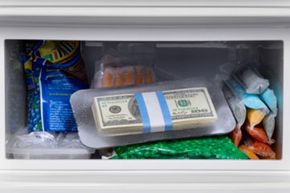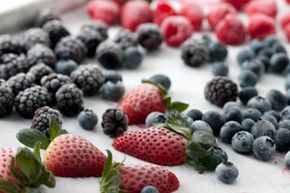“
 “Don’t throw away your money with your leftovers — freeze the extra food for another meal.Jeffrey Coolidge/Photodisc/Getty Images
“Don’t throw away your money with your leftovers — freeze the extra food for another meal.Jeffrey Coolidge/Photodisc/Getty Images
If you’re grocery shopping on a budget (and who isn’t these days?), you’ve probably tuned in to the benefits of eating frozen. But we’re not talking about microwaving TV dinners every night — freezing fresh produce and your home-cooked leftovers is really where you’re going to get the bang for your grocery buck.
Buying frozen has its place, of course, but unless you’re made of money, you don’t want to make a habit of paying more for convenience (and all those preservatives and artificial ingredients). But eating frozen is a different matter; frozen fruits and vegetables always make sense when you freeze them yourself. All you need to get started is a supply of plastic freezer bags and containers, aluminum foil and wax paper — and a willingness to make a few small changes to the way you shop and cook.
Once you get the hang of strategically utilizing your freezer, you might never buy a frozen meal again!
Nutritious Frozen Foods
We don’t want to knock the entire freezer aisle. Premade entrées and other processed products are expensive and often void of nutrition, but frozen fruits and vegetables can be a good buy. They’re usually picked at peak ripeness and retain their vitamins and minerals in the freezing process, losing only about 5 percent of most nutrients. They might even be more nutritious than their counterparts in the fresh-produce section, which are often picked before they’re totally ripe and are exposed to heat and light while they’re being transported. Especially in the winter, when a variety of fresh produce options can be slim (and pricey), buying frozen can be a good option.
There is a bit of a difference, nutrient-wise, between frozen fruits and vegetables. Fruits survive well because their acids neutralize the enzymes that promote deterioration, but vegetables do lose some nutritional value. If you’re freezing your own vegetables, you should blanch them to kill bacteria and enzymes — but that process causes them to lose as much as 30 percent of their vitamin C and some B vitamins.
Meats and poultry, however, come out of the freezer pretty much nutritionally intact. You can put meat directly into the freezer in its original packaging if you’re planning to use it fairly soon. But if you want to freeze it long-term, wrap it up more securely.
On the next page, we’ll talk about how best to freeze your food — and how long it will last.
Did You Know?
When you’re shopping for prefrozen vegetables, bags with the U.S. Department of Agriculture’s "U.S. Fancy" label will be more nutrient-packed than "U.S. No. 1" or "U.S. No. 2." And steaming and microwaving are the best cooking methods to retain the most vitamins in your veggies.
Tips for Saving on Frozen Foods
 “
“ “Freeze fresh fruit flat on a cookie sheet. Once solid, transfer the food to plastic bags for easy storage.Ray Kachatorian/Photographer’s Choice/Getty Images
“Freeze fresh fruit flat on a cookie sheet. Once solid, transfer the food to plastic bags for easy storage.Ray Kachatorian/Photographer’s Choice/Getty Images
You’ll save the most on frozen foods by shopping well, cooking efficiently and keeping careful track of what’s in your freezer. Here are some tips to keep in mind:
- When you see produce that’s in season and on sale, stock up and freeze it. That way you won’t have to make do with the supermarket’s frozen fruits and veggies (or expensive fresh goods) during the off-season.
- Learn what freezes well and what doesn’t. The no-freeze list includes lettuces and other leafy greens, dairy products (except fat free milk and butter), eggs, grains and potatoes.
- Freeze foods as soon as you know you won’t cook them.
- Know how long certain foods can be frozen. Most produce will last eight to 12 months, and meat and fish will keep three to four months.
- Figure out how to freeze different kinds of foods. Some work better in plastic containers or bags, some in foil, some in wax paper. To avoid freezer burn, squeeze all the air out of bags.
- Keep your freezer at 0 degrees Fahrenheit or below. A full freezer cools more efficiently than a half-full one, but you shouldn’t pack in more than 2 to 3 pounds of food per cubic foot.
- Whenever you can, cook more than you need and freeze the leftovers.
- Label or color-code everything in your freezer so you know what’s available to use.
- If you have the space, invest in a chest freezer to increase your storage. Then you can really stock up on the good buys, as well as have room for freezing homemade soups and casseroles!
Check out the next page for more information on eating frozen.
Lots More Information
Related Articles
- 5 Healthy Frozen Dinners
- History of TV Dinners
- How to Freeze Foods
- How Freeze-Drying Works
- What’s the advantage to bottom-freezer refrigerators?
Sources
- Bittman, Mark. "Freeze That Thought." The New York Times. May 5, 2009. (Nov. 14, 2011) http://www.nytimes.com/2009/05/06/dining/06mini.html
- Good Housekeeping. "Guide to Freezing Food." (Nov. 14, 2011) http://www.goodhousekeeping.com/recipes/cooking-tips/guide-to-freezing-food
- Gorman, Rachael Moeller. "Fresh vs. Frozen Vegetables: Are We Giving up Nutrition for Convenience?" Eating Well. November/December 2007. (Nov. 14, 2011) http://www.eatingwell.com/nutrition_health/nutrition_news_information/fresh_vs_frozen_vegetables_are_we_giving_up_nutrition_fo
- National Center for Home Food Preservation. (Nov. 14, 2011) http://nchfp.uga.edu/how/freeze.html
- Self. "Nutritional Effects of Food Processing." (Nov. 14, 2011) http://nutritiondata.self.com/topics/processing#cooking
- U.S. Department of Agriculture. "Freezing and Food Safety." (Nov. 14, 2011) http://www.fsis.usda.gov/factsheets/focus_on_freezing/index.asp


